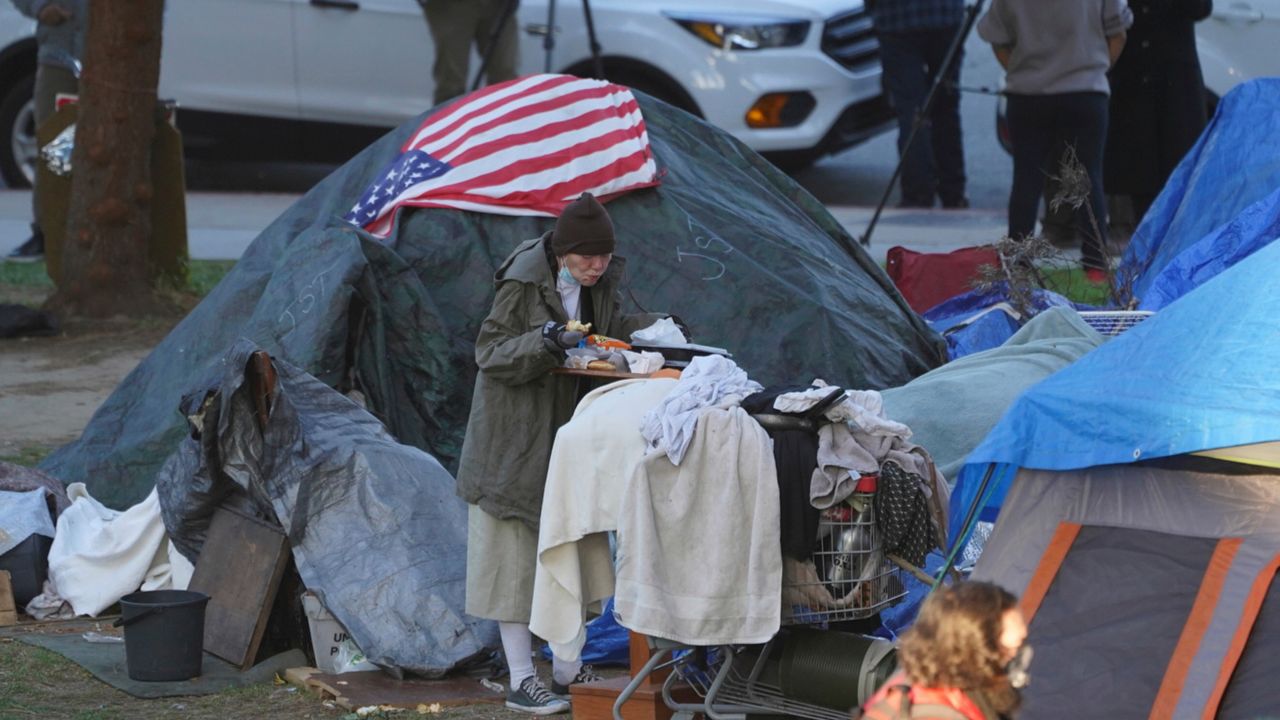LOS ANGELES (CNS) — The Los Angeles City Council Tuesday approved spending $2 million from its homeless services fund for the printing and installation of signage to enforce a new law prohibiting people from sleeping and camping on sidewalks and in parks.
The law, which went into effect Sept. 3, prohibits sleeping, sitting, camping and obstructing the public right of way at several locations, many of which require a resolution to be passed by the council before enforcement can take place.
The city administrative officer and chief legislative analyst estimate that 20 signs and five replacements are needed for each enforcement location. As of Oct. 6, requests for enforcement had been submitted for 116 locations, and 79 were approved by the council as of Tuesday.
Councilman Mike Bonin and Councilwoman Nithya Raman cast the two dissenting votes to fund the signage, as they did for the original ordinance and all resolutions requesting enforcement.
"Colleagues, when I first heard that the City Council was going to spend $2 million out of homelessness funds for signs to say 'you can't sit, sleep or lie here,' I actually didn't think it was serious. I thought that someone was parodying the Council or somebody was spreading a mistruth to make the Council look bad," Bonin said.
"I'm wondering how many temporary housing vouchers, motel vouchers, $1 million or $2 million could get you so that people can have a safe place to stay while they're waiting for an emergency housing voucher to find a place to live."
The City Council on Tuesday also approved nine locations in Councilman Mitch O'Farrell's district for enforcement of the ordinance, including within 500 feet of:
- Clifford Street Elementary School, at 2150 Duane St.;
- Camino Nuevo High School, at 500 W. Temple St.;
- Barnsdall Art Park, at 4800 Hollywood Blvd.;
- Las Palmas Senior Citizen Center, at 1820 North Las Palmas Ave.;
- Hollywood Recreation Center, at 1122 Cole Ave.;
- Vine Street Elementary School, at 955 Vine St.;
- Madison West Park, at 464 North Madison Ave.;
- Angelica's Daycare, at 6122 De Longpre Ave.; and
- Shatto Recreation Center, at 3191 W. Fourth St.
Those areas can be enforced under the law's provision to prohibit sleeping, sitting, camping and obstructing the public right of way within 500 feet of "sensitive" facilities, including schools, daycare facilities, parks and libraries.
That category requires the council to pass a resolution to designate a specific area for enforcement, post signage and give notice of the date that the ordinance will be enforced for the area.
Several people called into the council meeting Tuesday to oppose and support the anti-camping law and O'Farrell's resolution, many of whom specifically spoke about Vine Street Elementary School.
The principal of the school, Jennifer Chang, called in to support the ordinance, saying it is her job "to ensure that students feel safe walking to and from school and feel safe on campus."
"People need to know though that students have reported to me feeling afraid to come to school. Our staff has had to spend countless hours cleaning up debris, bottles of urine, feces, bags of feces, needles, used condoms inside and outside our school," she said.
A caller who identified herself as Sophie told council members it was their responsibility to provide people with housing and services before enforcing the ordinance.
"You do nothing about the causes of these homeless encampment. Yes, we don't want to see them, nobody wants to see homeless people. But guess what, you've created this issue, it's been in the making for decades," she said. "They have nowhere to go, and it's your responsibility to provide them with services and solutions."
A person named Steve, who was identified as a resident of an encampment included in the resolution, said, "I don't see what the city is going to try to solve by moving us from here, because we're just going to move to another part of the city. You're going to have the same problem all over again somewhere else."
On Sept. 14, the council approved a street engagement strategy that provides outreach teams to deploy to areas chosen for enforcement once a resolution is introduced. The teams, once staffed, will assess the encampments, determine how long engagement will take place, collaborate with city and county departments, as well as nonprofits, and connect encampment residents with services and interim and permanent housing placements.
Staffers from O'Farrell's office said they hired a non-profit service provider to perform outreach at the nine locations included in the resolutions, along with all areas of his district. The teams visited the nine locations in the resolution 270 times since spring 2021, according to O'Farrell's office, which did not immediately respond to a request for statistics on how many people were brought indoors and what types of housing or shelter they were provided.
It also was not immediately clear if the outreach teams told the encampment residents that enforcement of the ordinance would occur at the locations.



